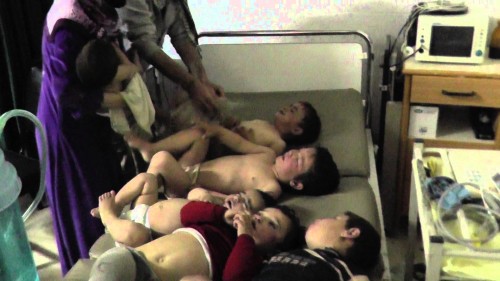LATEST: Victims of chlorine attack in Kafrzita in Hama Province, April 2014
On Thursday, we noted how a chemical weapons watchdog had formally expressed “serious concern” over the use of chlorine bombs between April and August 2014 in northwest Syria, with victims, witnesses, and medical staff all pointing to attacks by the Assad regime’s helicopters.
The Organization for the Prohibition of Chemical Weapons approved the findings on Wednesday in an open vote. It emphasized that “any use of chemical weapons anywhere, at any time, by anyone, under any circumstances is unacceptable and would violate international law”, and it expressed the “strong conviction that those individuals responsible for the use of chemical weapons should be held accountable”.
However, as Foreign Policy reveals, there is far more behind the scenes to the story — namely, the attempt by Iran to prevent any public criticism of its ally President Assad.
Even though Russia — which has also been vital in maintaining Assad’s hold on power in the 4-year conflict — joined the US in crafting the resolution, Iran objected. Its delegation said that it was premature to confront Syria over the use of chlorine and that “any decision by the [OPCW] executive council merely serve the aims of specific countries and does not properly address the situation”.
The move had a good chance of succeeding. Even though the other 39 members of the OPCW Executive Council indicated they would back the resolution, the Organization prefers unanimous approval of its decisions. However, the US intervened, working with other delegations to lobby for a public vote. Isolated, Iran had to give way.
Tehran’s attempt was the latest in a series of moves to block any blame of the Assad regime over the attacks, which killed more than 20 people and injured hundreds of others. In May 2014, OPCW investigators came under armed attack during their sole attempt to visit the sites. Damascus subsequently insisted that any casualties were from homemade weapons used by insurgency.
The OPCW team persisted by interviewing dozens of eyewitnesses, emergency workers, doctors, and nurses and by examining videos and photographs. It produced three reports, with the latest in December, concluding with “a high degree of confidence that chlorine has been used as a weapon.” Diplomatic protocol prevented it from explicitly holding the Assad regime responsible.
OPCW head Ahmet Uzumcu has held off for months from presenting the mission’s finding to the UN Security Council, despite US pressure. The Americans also asked UN Secretary-General Ban Ki-moon to forward the reports to the Council, but later withdrew the request.
On December 30, the US and 7 of the other 15 Security Council members presented the three OPCW reports to the Council with a request that they be made public, but Russia protested the move. Washington and Moscow discreetly agreed that future OPCW reports on chlorine — but not the past findings — could be forwarded to the Council.

